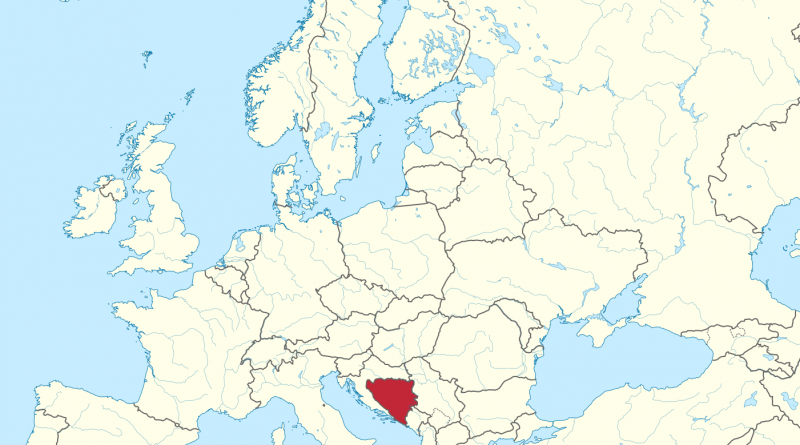Looking into the past to change the future: Dayton Peace Accords 20th Anniversary preview
By: Rose Rucoba – Staff Writer
In commemoration of the 20th anniversary of the Dayton Peace Accords, UD hosted a student panel of international students from Bosnia and Herzegovina to share their stories. The event also educated students about the events in the Balkans that led to the Dayton Peace Accords.
The student panel took place in Sears Recital Hall on Nov. 9 and was filled to maximum capacity with students and professors eager to learn about this significant, yet often overlooked, historical event that happened at Dayton.
Amy Anderson, Ph.D., executive director of the UD Center for International Programs, opened the event.
“What can we learn from the past? What can we learn for the future?” Anderson asked.
She said she hoped at the end of the day, UD students had a better understanding of the events leading up to the Dayton Peace Accords and why it is still celebrated today.
Jusuf Salih, Ph.D., a religious studies professor, then addressed the room, delving into the rich and bloody history of the Balkans.
He explained how trouble in the Balkans began towards the end of the Cold War in 1989.
At the time, Yugoslavia was comprised of Bosnia and Herzegovina, Croatia, Serbia, Macedonia, Montenegro and Slovenia.
After Croatia, Bosnia and Herzegovina tried to claim independence, tensions heightened. War ensued in the early 1990’s as the Serbians revolted against the separation and took hold of Yugoslavia.
They instigated an ethnic cleansing of Muslims, using horrific and inhumane tactics to gain control such as concentration camps, massacres and rape.
On top of this, a war within a war emerged between the Croats and the Muslim Bosniaks as both groups tried to claim land.
The war lasted four years, destroying an entire region. Casualty estimates range from 90,000 to 300,000.
In a final effort to end the war, world leaders wrote a peace agreement and, out of a variety of major global cities, chose Dayton as the spot to sign it because of its seclusion from the media.
On Nov. 21, 1995, the leaders signed the Dayton Peace Accords at the Wright-Patterson Air Force Base just outside of the city. With this agreement, they hoped to establish peace in Bosnia by dividing it into two parts: a Bosniak-Croat region and the Bosnian Serb-Republic with Sarajevo as the uniting capital.
The second half of the event was a Q&A session between the student panel and the audience. Dzeneta Begic, Tomislav Vidovic and Tamara Culum—the three students selected for the panel—are recipients of the Dayton Peace Accords Fellowship, a full one-year scholarship to UD for students from Bosnia and Herzegovina.
The panel gave the audience first-hand accounts of how Bosnia healed after the war and the situation in the area now, 20 years later.
The event ended with a few final notes from the student panel. All three of them encouraged UD students to participate in study abroad and exchange programs if possible and said that anyone who traveled to Bosnia would not regret it.
Following is an edited dialogue of the Q&A session:
Q: What kind of impact has the conflict made on your life?
Dzeneta Begic: I’m really glad that I did not lose anyone in the war. I was born in 1994, but I know from hearing stories from my mom and dad how painful it was. Because of the impact of the war, my mom lost her first cousin to a grenade. Knowing that my parents went through all that, it’s very hard.
Tamara Culum: My dad fought in the war. We are not very keen on talking about those experiences because no one would ever want to go through it. We don’t talk about it.
Tomislav Vidovic: My town is mostly comprised of Muslims and Croats, who were separated after the war. One part of the city belongs to one nation, and the other part belongs to the other.
Q: What can we learn and take forward from this event?
Begic: We have beautiful places to live and beautiful places to go to and tourism, but so much ethnic tension. I don’t want that to happen again or to my children. War babies like me, Tamara and Tomislav have more hatred than nationalism in them. I’ve worked on a lot of projects back home that aim to maintain peace…and I feel like every time I try and do something, nothing happens. That’s what hurts me.
Culum: You should appreciate everything in your life because you never know what will happen.
Vidovic: I think all three nations of Bosnia should learn to respect each other—that is all.
Q: What is the biggest problem facing Bosnia today?
Begic: There is corruption even 20 years later. Bosnia is the only country in the world that has three presidents for one country. It is hard for all of them to agree because they each have different interests. They go out…and try to manipulate the masses. The biggest problem is that they are trying to divide us.
Culum: Today’s youth want to get away. They think that leaving the country would solve all their problems. Some don’t want to integrate, to learn and take back with them the knowledge they gained.
Vidovic: Unemployment, but I also agree with the Dzeneta and Tamara.
Follow @FlyerNews for live coverage of the Dayton Peace Accords 20th Anniversary Conference. The conference takes place Thursday and Friday at UD’s River Campus, 1700 S. Patterson Blvd.
Photo of map courtesy of Wikimedia Commons.



